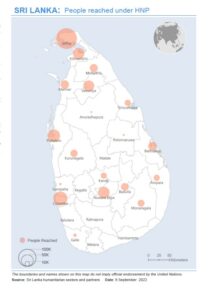by Office of the Coordination of Humanitarian Affairs, New York, September 16, 2022
PDF report with map at Sri Lanka Multi-Dimensional Crisis Situation Report No. 5
 This report is produced by the OCHA Regional Office for Asia and the Pacific (ROAP) on behalf of the ISCG. The updates below cover activities carried out between 09 September – 16 September and provide an overview of response activities to meet the needs articulated in the Humanitarian Needs and Priorities (HNP) Plan.
This report is produced by the OCHA Regional Office for Asia and the Pacific (ROAP) on behalf of the ISCG. The updates below cover activities carried out between 09 September – 16 September and provide an overview of response activities to meet the needs articulated in the Humanitarian Needs and Priorities (HNP) Plan.
HIGHLIGHTS
- According to the joint FAO/WFP Crop and Food Security Assessment Mission (CFSAM) that was released on 12 September, 6.2 million people were estimated to be food insecure in June.
Without food assistance, the food security situation is expected to deteriorate further. - The Government of Sri Lanka and the International Monetary Fund (IMF) have reached a Staff-Level agreement for a 48-month, US$ 2.9 billion Extended Fund Facility.
The agreement is subject to the approval by IMF management and the Executive Board, subject to progress on reducing public debt to a sustainable level. - Tenders have been called for the procurement of 125,000 MT of urea (fertilizer) for the upcoming Maha season, which normally is from September to March, with repurposed support of US$ 110 million from the World Bank’s Economic Crisis Response Programme.
SITUATION OVERVIEW
Sri Lanka continues to experience an unprecedented economic crisis with high inflation, rising commodity prices, power shortages and scarcity of fuel. The crisis is deepened by a serious reduction in agricultural production. In the context of shortages of many food products, fuel, medicines, and other essential items, protests broke out in March 2022 and became mass protests in April and July 2022. On 13 July, the President of Sri Lanka left the country and the Prime Minister, in his capacity as an acting President, declared a temporary state of emergency. The President resigned a few days later and on 21 July the Prime Minister was elected President by a parliamentary vote. Protests have since then declined in frequency and size. The former President has since returned to Sri Lanka on 03 September.
Asia’s highest inflation rates and ongoing fuel scarcity continue to threaten food security in Sri Lanka. The Colombo Consumer Price Index reached 64.3 per cent over the year to August 2022, driven in part by food inflation of 93.7 per cent.
Early indicators show that agricultural output has decreased by 40 per cent compared to the 2020 Yala season, and prices for food items continue to increase due to high fuel prices, shortages of fertilisers and a shortage of animal feed.
In June and July, at the request of the Government of Sri Lanka, FAO and WFP jointly carried out the Crop and Food Security Assessment Mission (CFSAM), which analysed the country’s agricultural production and households’ food security conditions. According to the report, which was released on 12 September, acute food insecurity has risen dramatically, and it is estimated that more than 6.2 million people (28 per cent of the population) are moderately acute food insecure, with 66,000 people being severely acute food insecure. The report further states that the situation is likely to deteriorate during the lean season from October 2022 to February 2023.
In September, the Government of Sri Lanka and the International Monetary Fund (IMF) reached a Staff-Level agreement for a 48-month, US$ 2.9 billion Extended Fund Facility. The agreement is subject to the approval by IMF management and the Executive Board, subject to progress on reducing public debt to a sustainable level. The United States announced a US$ 40 million aid package for Sri Lanka to purchase fertilizer and other key agricultural inputs for farmers. On 16 September, the Government of Japan announced that it will provide an additional US$ 3.5 million for Sri Lanka in response to the deterioration of the humanitarian situation.
Disclaimer
- UN Office for the Coordination of Humanitarian Affairs
- To learn more about OCHA’s activities, please visit https://www.unocha.org/.